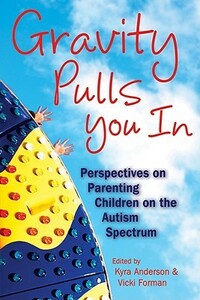Take a photo of a barcode or cover
2 reviews for:
Gravity Pulls You in: Perspectives on Parenting Children on the Autism Spectrum
Bruce Mills, Maggie Kast, Kyra Anderson, James Wilson, Bobbi Lurie, Kristen Spina, Ann Douglas, John Elder Robison, Anjie Kokan, Aileen Murphy, Ralph James Savarese, Emily Willingham, Kristina Chew, Janet Kay, Veronika Hill, Susan Segal, Chantal Sicile-Kira, Vicki Forman, Drama Mama, Cheri Brackett, Mama Mara, Laura Shumaker, B.E. Pinkham, Kimberly K. Farrar, Lesley Quinn, Barbara Crooker, Grey Brown, Mary McLaughlin, MothersVox, Susan T. Layug, Carolyn Walker
2 reviews for:
Gravity Pulls You in: Perspectives on Parenting Children on the Autism Spectrum
Bruce Mills, Maggie Kast, Kyra Anderson, James Wilson, Bobbi Lurie, Kristen Spina, Ann Douglas, John Elder Robison, Anjie Kokan, Aileen Murphy, Ralph James Savarese, Emily Willingham, Kristina Chew, Janet Kay, Veronika Hill, Susan Segal, Chantal Sicile-Kira, Vicki Forman, Drama Mama, Cheri Brackett, Mama Mara, Laura Shumaker, B.E. Pinkham, Kimberly K. Farrar, Lesley Quinn, Barbara Crooker, Grey Brown, Mary McLaughlin, MothersVox, Susan T. Layug, Carolyn Walker
Good book. A lot of stuff about parenting "high functioning" kids that I could not relate to, but all in all well-written.
Sitting in the wicker chair next to me, the mother’s weary expression mirrored my own. We sat silently, focused on our smartphones, not making eye contact with the other parents in the waiting room but keeping a watchful eye on our boys playing with toys in a small alcove.
Her son strode over to her, moved close to her face as if he was going to give her a kiss, and bellowed for all of us in the waiting area to hear, “I hate you!”
Oh, God, I thought, my stomach sinking, hoping that Boo wouldn’t laugh or give the boy a high five or repeat the same to me. All while feeling horrible for the mother, who was reacting calmly (although I could tell she was that certain kind of shaken that happens to those of us in such situations) and speaking in a flat tone as if this was a regular occurance. Which it most likely was, given that we were congregated together in the minutes before our sons’ weekly social skills group began.
I wanted to say something, but I didn’t know what to say.
I didn’t dare open my mouth, for fear of saying the wrong thing.
I wanted to say that I understood, even if the response would have been no, you can’t possibly. I wanted to tell her that everything would be OK, even if that wasn’t the case. I wanted to tell her that I’ve been her; that at this very moment it might not seem like it, but I am her.
Even those of us who live this life are sometimes at a loss for what to do for another traveling down our road.
The mom in the waiting room with is is exactly why Gravity Pulls You In, a collection of 33 personal essays and poems about the moments that make up our lives in this strange and beautiful world of parenting children on the autism spectrum, is such an important book. I don’t know this for certain, but the mom in the waiting room with me could very well be the person whom editors Kyra Anderson and Vicki Forman might have had in mind while putting this wonderfully poignant and heartfelt book together, and who the contributors might have been thinking of when deciding how to share their powerful words.
What Gravity Pulls You In does so well is to let you know that you’re not alone. You’re not the only one who stands at the elevator with a colleague and thinks here we go in response to the innocuous-seeming question of, “So, how’s the family?” and immediately turns the conversation to his Ivy League bound 18 year old. You’re not the only one who’s kid screams at birthday parties, on sensory overload, when other kids are gleefully enjoying the noise and excitement. You’re not the only one who has gotten thrown out of baby gym classes. Grocery stores. A total of seven schools.
While parents of children on the autism spectrum will find camaraderie in these stories, it is also well worth reading for others. So often I’ve had comments on my blog, or in “real life,” from people who say that they don’t know anyone with autism, or that they’ve heard of Asperger’s but aren’t quite sure what exactly that means. A very large part of why I write about our family’s journey on this road is to give those who aren’t familiar with this a glimpse into our lives, and to say through our stories and experiences that this is the mixed bag of our life: that, yes, it can be difficult and challenging, but there are some good moments too. To give the full picture, so to speak, so that others can see that the gains our son makes are very often huge accomplishments accompanied by some huge challenges and difficult moments.
Kyra Anderson (pictured on left) at BlogHer10, signing
copies of Gravity Pulls You In.
“These are our children,” writes editor Kyra Anderson in the preface to Gravity Pulls You In. “They enlighten us, delight us, annoy us, and open our hearts to injustice, outrage, exquisite beauty, and possibility. We hope to shepherd them into lives bigger and more realized than our own. When that can’t happen, we grieve, we accept, we write, and through that process, we hold on to what we cannot see that may still be on the way.” (pgs. xii and xiii)
Gravity shows its reader these moments and in doing so, gives you the gift of exhaling. Breathing out can sometimes be a foreign concept for those of us who mark time holding our breath in preparation for the next meltdown or with the latest parade of specialists making pronouncements about your two year old’s development in their all-knowing, my word is Gospel way. Gravity gives you words that make you realize that others understand, others have come through this OK, others are living this life right now.
That’s what I wanted to tell the mom in the waiting room. I wanted to give her a copy of Gravity Pulls You In, to ask if she knew about us, if she knew that there are moms like us as close as her keyboard, a support group right there in her iPhone. I wanted to tell her that there is this entire community of moms online, writing about our kids and the horrible moments like this very ironic and horrible one right here, in the social skills therapy group waiting room. That we get it.
“When my son was five years old,” continues Kyra in the preface. “he asked me, ‘How fast is the earth spinning? How fast is it spinning through space? Not around the sun, but around itself?’ At the time, I was stymied, as I often am when presented with his questions. I allowed that it must be going pretty fast….
‘Gravity, Mom,’ he answered for us both. And then he thought for awhile. ‘I have an idea! Gravity doesn’t really pull you down, it pulls you in. So, if you were upside down, it wouldn’t pull you away from the earth, it would pull you in, toward the earth, toward its center!’
Huh. Gravity pulls you in.
He’s right. It does pull you in, not just to the center of the earth, but to the center of yourself, if you let it. Things that are weighty, things that demand a closer look,a new approach, a shift in perspective, those things pull you in. Even when you are spinning, even when you are moving much more quickly than you thought was possible, even when you find yourself in territory where instincts alone don’t feel like enough to complete the revolution.
The circumference of the earth at the equator is about 25,000 miles. Every twenty-four hours, the earth travels 25,000 miles around itself through space. That means we’re going more than 1,000 miles per hour. That’s fast.
And we’re not falling off.”
No, we’re not falling off. We’re holding on because of a force that keeps us grounded to one another, to what we believe, to our children, to possibility and to hope.
As I wrote in this post, I was thrilled to meet Kyra Anderson and several of the other contributors to Gravity Pulls You In at BlogHer. I’ve read many of their blogs for awhile now and consider them friends. I don’t think that has clouded my thoughts and review of the book, as I think I would have loved it even if they were all strangers to me … which I am so grateful that they are not. I also purchased the book (with a gift card given to me when I left my previous job) prior to meeting any of the contributors.

